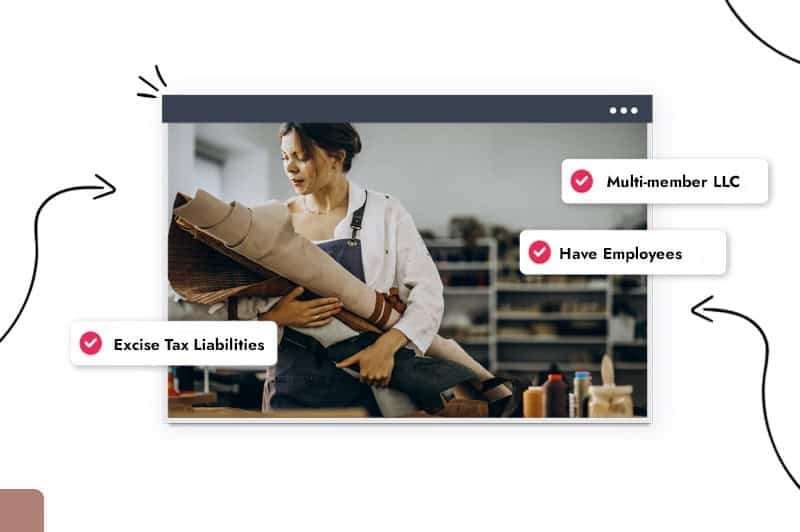Many sole proprietors (including me) upgrade to an LLC to profit from the many tax and liability benefits. But, when that happens, the following 2 questions arise:
- Can I change my employer identification number (EIN) from a sole proprietorship to LLC?
- Do I need a new EIN when changing from sole proprietor to LLC?
And let’s say you’ve been using your Social Security number (SSN) for your sole proprietorship and want to start a single-member LLC (taxed as a sole proprietor by default). Surely you can use that, right? You’d think so, wouldn’t you? Unfortunately, the answer is yes, no, and maybe.
I’ll tell you why, plus when your sole proprietorship needs an EIN, and 7 significant reasons you should get one even if you don’t need one.
Cases in Which a Sole Proprietorship Needs an EIN

Sole proprietor owners and their businesses are not separate taxable legal entities, so the IRS doesn’t require them to have an EIN.
Instead, you can use your SSN to identify your business come tax time and report your income and expenses using Form 1040 Schedule C.
However, some cases require a sole proprietor to get an EIN, such as:
- You hire one or more employees
- File for bankruptcy
- You incorporate (start a multi-member/single-member LLC or corporation)
- Take on partners/operate as a partnership
- Buy or inherit an existing business you use as a sole proprietorship
- Have a Keogh or Solo 401(k) retirement plan
- File pension returns or specific excise tax
- Make payments to non-U.S. residents and withhold taxes
- Administer estates or trusts
- Work with farmers’ cooperatives, nonprofits, or use administrators
When none of the above apply to your business, you don’t need a sole proprietorship EIN.
Okay, simple enough, but what about that LLC you want to start? Will you need a new EIN?
I’ll clarify next:
Does an LLC Have to Get an EIN?
The IRS “Do You Need a New EIN” page says that the sole proprietorship owner needs an EIN if they form a corporation, multi-member LLC or partnership.
However, when we look at the IRS “Single Member Limited Liability Companies” page, it says that you must use either your SSN or EIN when filing tax returns.
So, what’s the answer? It comes in 2 parts:
- It depends on the type of LLC you form
- And how you run it
Stick with me, and I’ll explain.
Part 1: Single-member and multi-member LLCs
The IRS doesn’t require single-member LLC owners to get a separate EIN because they’re not employees of the LLC. So, when you move from a sole proprietorship to a single-member LLC, you can use your SSN to report returns and pay taxes using Schedule C (Form 1040).
However, you will need an EIN if you form a multi-member LLC.
Part 2: How you run your LLC
Let’s say you start a single-member LLC using your SSN but then need employees to expand. Here, you’d need an EIN.
And even if you don’t hire employees and are a single-member LLC that can use your SSN, most LLCs need an EIN when:
- You have employees
- Specific retirement plans
- File a pension plan or excise tax return
- Buy or inherit an existing LLC business
- Form a partnership
- File for bankruptcy
Additionally, an LLC needs an EIN if it:
- Yep, it’s a multi-member LLC (over one member)
- Or pays tax as a C or S corporation
You apply for an EIN for your LLC by filing Form SS-4, Application for Employer Identification Number.
Even if none of the above apply, many sole proprietors and LLC owners get an EIN because of the many advantages, which we’ll look at below.
Should You Get an EIN for Your Sole Proprietorship (Even if it’s Optional?)

That’s a question many sole proprietors ask themselves at some stage. I did and here’s what I learned.
Getting an EIN for my sole proprietorship before I thought I needed one was beneficial. Perhaps not immediately, but definitely as my business grew, especially when I formed my first single-member LLC.
For example:
- Using an EIN can help reduce identity theft
- An EIN conveys professionalism to vendors and clients
- You need an EIN to establish an Independent Contractor Status
- Many banks require an EIN to open a business account
- A business account helps with establishing a credit history
- A credit history increases your chances of getting financing
- And you’re ready to hire people the moment you need them
I didn’t need an EIN for all 7 reasons, but I did for 6! Review the summary below to help you decide:
Need an EIN for Your LLC or Sole-Prop? – Summary
| You need an EIN if you | LLC | Sole-Prop |
| Hire employees | Yes | Yes |
| File for bankruptcy | Yes | Yes |
| Buy or inherit an existing business | Yes | Yes |
| Have a Keogh or Solo 401 (k) retirement plan | Yes | Yes |
| Form a partnership | N/A | Yes |
| Form a multi-member LLC | Yes | N/A |
| Choose to be taxed as a corporation | Yes | N/A |
| Withhold taxes on payments made to non-residents | Yes | Yes |
| Work with nonprofits, farmers’ cooperatives, or plan administrators | Yes | Yes |
| Open a business bank account | Likely | Likely |
Conclusion
You now know the answers to 2 of the most common questions:
- Can I change my EIN from a sole proprietorship to LLC?
- Do I need a new EIN when changing from a sole proprietorship to an LLC?
In case you missed it, the answers are no and yes.
And while you could run your sole proprietorship for years never needing an EIN, the advantages of having one make getting one an easy decision!
